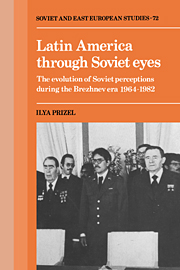 Latin America through Soviet Eyes
Latin America through Soviet Eyes Book contents
- Frontmatter
- Contents
- Preface
- Acknowledgments
- Introduction
- Part I Soviet perceptions of Latin America's global role
- Part II Soviet perceptions of Latin American social structures
- Part III Soviet–Latin American relations during the Brezhnev era
- Introduction
- 11 Case study: Mexico
- 12 Case study: Chile
- 13 Case study: Brazil and Argentina
- Part IV Conclusion: the emerging Soviet perception of Latin America and the future of Soviet policy toward the hemisphere
- Conclusions
- Epilogue – Latin America: the Long March
- Notes
- Bibliography
- Index
11 - Case study: Mexico
Published online by Cambridge University Press: 05 February 2012
- Frontmatter
- Contents
- Preface
- Acknowledgments
- Introduction
- Part I Soviet perceptions of Latin America's global role
- Part II Soviet perceptions of Latin American social structures
- Part III Soviet–Latin American relations during the Brezhnev era
- Introduction
- 11 Case study: Mexico
- 12 Case study: Chile
- 13 Case study: Brazil and Argentina
- Part IV Conclusion: the emerging Soviet perception of Latin America and the future of Soviet policy toward the hemisphere
- Conclusions
- Epilogue – Latin America: the Long March
- Notes
- Bibliography
- Index
Summary
Mexico was the first Latin American country, and indeed one of the first countries in the world, to recognize the Bolshevik regime. Mexico and Russia emerged at about the same time from their respective revolutions, both of which were directed in large measure against the existing world order, and thus it was natural that the two countries felt sympathy for each other. Moreover, Lenin saw in Mexico a potential counterweight to the expansion of the United States, the most powerful member of the imperialist bloc, while the Mexican government of President Carranza hoped that Russia's anti-imperialist policy would constrain future US interventions in Mexico.
The apex of Soviet–Mexican relations was reached during the mid-1920s, when Alexandra Kollanti was appointed ambassador to Mexico. Relations deteriorated in 1930, when Mexico first alleged that the Soviet embassy had aided a Comintern-directed uprising in Veracruz province and then broke its diplomatic ties with the USSR. Relations remained poor during the Spanish civil war, despite the fact that Mexico and the USSR were the only countries to support the Republican side openly. This was due to Mexico's having granted refuge to Trotsky and its bitter criticism of the Molotov–Ribbentrop Pact of 1939.
Soviet–Mexican ties, renewed in 1942, remained minimal, even though Mexico and Argentina were the only Latin American countries to defy US pressure during the cold war and to refuse to sever ties with the USSR.
- Type
- Chapter
- Information
- Latin America through Soviet EyesThe Evolution of Soviet Perceptions during the Brezhnev Era 1964–1982, pp. 155 - 159Publisher: Cambridge University PressPrint publication year: 1990
